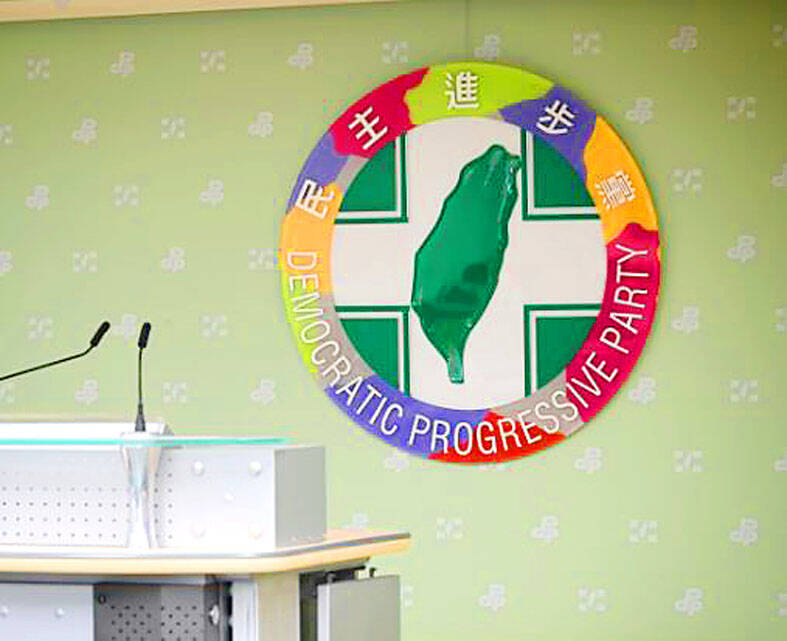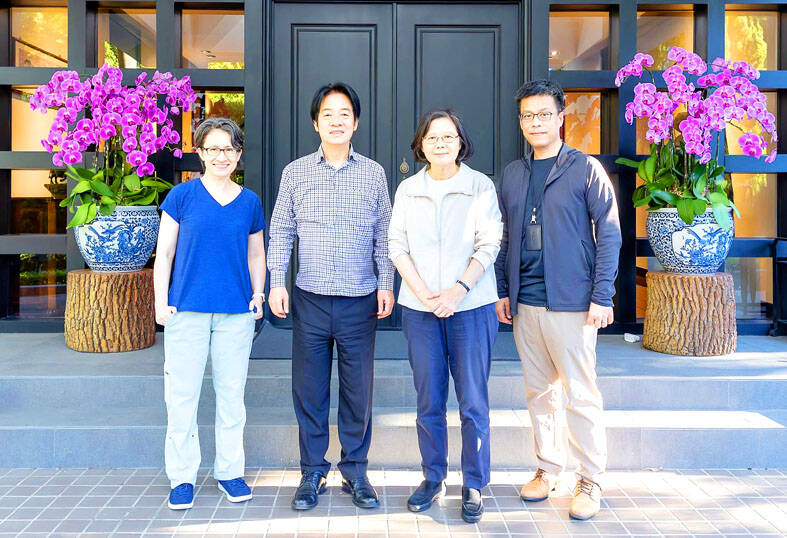The Democratic Progressive Party (DPP) would reassess its policies and possibly reshuffle the Cabinet to better meet the public’s expectations following defeats in Saturday’s recall elections and referendum vote, DPP Legislator Lin Chun-hsien (林俊憲) said yesterday.
The party was dealt a heavy blow on Saturday after voters rejected efforts to recall seven Chinese Nationalist Party (KMT) lawmakers. Last month, 24 KMT lawmakers similarly survived recall elections.
Although a referendum to restart the Ma-anshan Nuclear Power Plant in Pingtung County failed to meet the threshold, it was supported by the majority of participating voters. The DPP opposed the measure.

Photo: Chen Yi-kuan, Taipei Times
Lin said that the party would review its policies and bounce back.
Although the recalls were initiated by civil groups, their failure at the polls affected the public’s perception of the DPP, so the party must reflect on that and find ways to better meet expectations, he said.
President William Lai’s (賴清德), who is also DPP chairman, on Saturday evening pledged to make changes.

Photo: Screen grab from President William Lai’s Facebook page
“A Cabinet reshuffle is already under way,” Lin said.
He added that the party would initiate a comprehensive review and make necessary adjustments on how it works with the Legislative Yuan, where the DPP is in the minority.
The failure of the recall votes is a “stern warning” for the party, DPP Legislator Chiu Yi-ying (邱議瑩) said.
“We must conduct a full review, to find out why the Executive Yuan could not gain the trust of the majority of voters. Maybe a change in the direction of policies is needed,” she said.
“It was also not a good result for us on the referendum, indicating we should reassess our nation’s energy policy. Now is the time for a reset, for a new start to win back voters’ trust in our party,” she said.
While 74.17 percent of participating voters supported the referendum, the measure failed to meet the threshold of 25 percent of eligible voters, about 5 million people, needed to pass.
DPP caucus chief executive Rosalia Wu (吳思瑤) on Saturday night wrote on Facebook that “you cannot turn a wrong into something right, just because you won an election.”
“When doing things right, they would not become wrong just because you lost the vote,” she wrote.
She also rejected calls by opposition parties to release former Taiwan People’s Party chairman Ko Wen-je (柯文哲), saying they have distorted the voting results and are using a victory at the polls to engage in political intimidation.
Wu and several DPP caucus officials have offered to resign from their posts.
DPP caucus whip Ker Chien-ming (柯建銘) said they all have performed at their best and expressed the hope that they would stay on “to continue fighting.”
Former president Tsai Ing-wen (蔡英文) yesterday visited Lai at the presidential residence to give her support to his administration.
Vice President Hsiao Bi-khiam (蕭美琴) was also present at the gathering.
They exchanged views on domestic and international affairs, Lai said.
“We shall face the upcoming challenges, and will take up people’s voices to push forward and seek more cooperation to lead Taiwan to a brighter future,” he said.
Additional reporting by Chen Yun and wire

The manufacture of the remaining 28 M1A2T Abrams tanks Taiwan purchased from the US has recently been completed, and they are expected to be delivered within the next one to two months, a source said yesterday. The Ministry of National Defense is arranging cargo ships to transport the tanks to Taiwan as soon as possible, said the source, who is familiar with the matter. The estimated arrival time ranges from late this month to early next month, the source said. The 28 Abrams tanks make up the third and final batch of a total of 108 tanks, valued at about NT$40.5 billion

Two Taiwanese prosecutors were questioned by Chinese security personnel at their hotel during a trip to China’s Henan Province this month, the Mainland Affairs Council (MAC) said yesterday. The officers had personal information on the prosecutors, including “when they were assigned to their posts, their work locations and job titles,” MAC Deputy Minister and spokesman Liang Wen-chieh (梁文傑) said. On top of asking about their agencies and positions, the officers also questioned the prosecutors about the Cross-Strait Joint Crime-Fighting and Judicial Mutual Assistance Agreement, a pact that serves as the framework for Taiwan-China cooperation on combating crime and providing judicial assistance, Liang

A group from the Taiwanese Designers in Australia association yesterday represented Taiwan at the Midsumma Pride March in Melbourne. The march, held in the St. Kilda suburb, is the city’s largest LGBTQIA+ parade and the flagship event of the annual Midsumma Festival. It attracted more than 45,000 spectators who supported the 400 groups and 10,000 marchers that participated this year, the association said. Taiwanese Designers said they organized a team to march for Taiwan this year, joining politicians, government agencies, professionals and community organizations in showing support for LGBTQIA+ people and diverse communities. As the first country in Asia to legalize same-sex

MOTIVES QUESTIONED The PLA considers Xi’s policies toward Taiwan to be driven by personal considerations rather than military assessment, the Epoch Times reports Chinese President Xi Jinping’s (習近平) latest purge of the Chinese People’s Liberation Army (PLA) leadership might have been prompted by the military’s opposition to plans of invading Taiwan, the Epoch Times said. The Chinese military opposes waging war against Taiwan by a large consensus, putting it at odds with Xi’s vision, the Falun Gong-affiliated daily said in a report on Thursday, citing anonymous sources with insight into the PLA’s inner workings. The opposition is not the opinion of a few generals, but a widely shared view among the PLA cadre, the Epoch Times cited them as saying. “Chinese forces know full well that